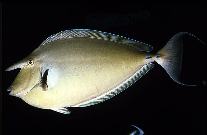| Family: |
Acanthuridae (Surgeonfishes, tangs, unicornfishes), subfamily: Nasinae |
| Max. size: |
70 cm FL (male/unsexed); max. reported age: 55 years |
| Environment: |
reef-associated; marine; depth range 0 - 180 m |
| Distribution: |
Indo-Pacific: Red Sea and East Africa (Ref. 3145) to the Hawaiian, Marquesas and Tuamoto islands, north to southern Japan, south to Lord Howe and Rapa islands. Presence in Somalia to be confirmed (Ref. 30573). |
| Diagnosis: |
Dorsal spines (total): 6-6; Dorsal soft rays (total): 27-30; Anal spines: 2-2; Anal soft rays: 27-30. This species is characterized by the following: body depth vary from about 2.0 in SL (in subadults) to 2.4-2.6 (adults) in SL; with a tapering, bony, horn on forehead of adults projecting anteriorly at level of eye but not extending in front of mouth (horn first as a bump on forehead at a length of about 12 cm); dorsal profile from snout to horn straight, angle of about 45°; 2 peduncular plates with well-developed forward-curving knife-like spines; emarginate caudal fin when young, truncate with filamentous lobes in adult; males apparently with longer horn, larger peduncular keels and longer caudal filaments than females of the same size; body yellowish to olivaceous gray dorsally, paler ventrally, with blue peduncular plates and keel spines; lips whitish or blue; blue area is sometimes present around pectoral fin; dorsal and anal fins yellowish with narrow blue margins; caudal fin orangish basally, shading to gray, with a broad, pale greenish posterior border and caudal filaments are edged in blue; one transient color phase is a blotchy pale greenish zone below the spinous portion of dorsal fin that narrows and ends beneath the pectoral fin (Ref. 27362). |
| Biology: |
Adults inhabit channels, moats, lagoon and seaward reefs with strong surge (Ref. 48637). Benthopelagic (Ref. 58302). Typically occurring in small groups. Sometimes solitary (Ref. 90102). Juveniles in shallow protected bays and harbours (Ref. 48637). Mainly diurnal, feed on coarse leafy brown algae like Sargassum. Pair-spawning has been observed. Minimum depth reported taken from Ref. 128797. |
| IUCN Red List Status: |
Least Concern (LC); Date assessed: 07 May 2010 Ref. (130435)
|
| Threat to humans: |
reports of ciguatera poisoning |
Source and more info: www.fishbase.org. For personal, classroom, and other internal use only. Not for publication.
